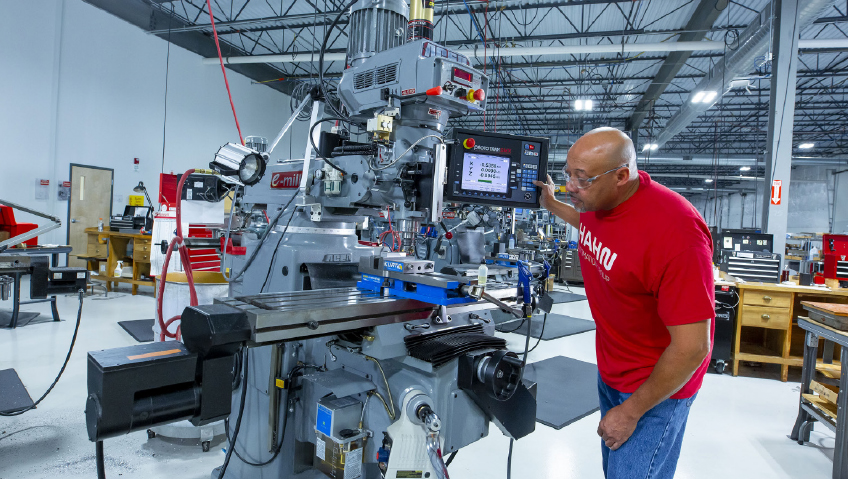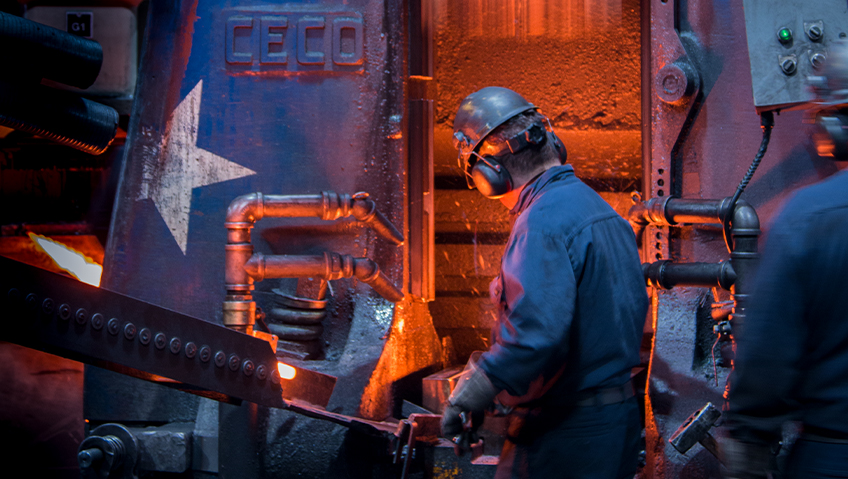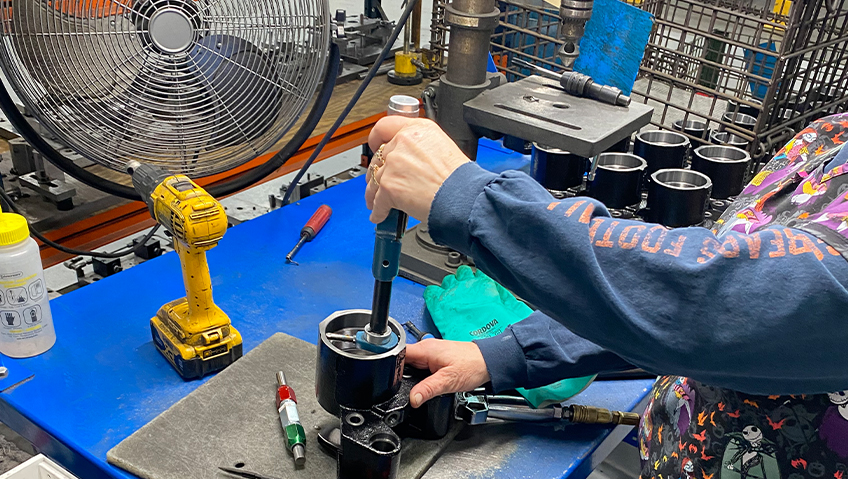Don’t let the name fool you; The Bucket Shop (TBS) does not deal in mop buckets. The company’s name has seen it through its humble beginnings in the early 1990s, operating out of a garage as a smaller welding shop, all the way to its transformation into a modern-day mining equipment operation with over 100 employees. The family-owned business run by Ross and Paul Woodward with Sharon Michaud, President and Vice Presidents, respectively, has continued to expand its offerings.
As Business Optimization Lead Jamieson Pouw says of the current operation, TBS can fabricate large truck boxes and structural components along with mining buckets—and that is just the beginning. “If it’s made out of steel and can be repaired or built, that’s our claim to fame.”
The last few years, of course, have had global implications for business because of the COVID-19 pandemic. In 2020, the federal government of Canada declared a few sectors to be strategic and necessary, with mining falling under these designations due to its role as a multi-billion-dollar economic engine of the country. Likewise, TBS’s role in the mining supply chain kept it in business throughout those tough times.
Once pandemic measures were lifted, the business came back stronger and busier than ever before, which Pouw believes is a testament to the owners and their confidence and investment in the sector. He says that The Bucket Shop’s partners and proponents in the provincial and federal governments have supported the company financially through several key programs, without which TBS could not have expanded in the way it has.
The Bucket Shop’s present-day corporate structure has been rationalized on two elements: its fabrication facility and a mobile fabrication division called Steeltec, which sees welders and millwrights travelling to mine sites to support repairs, overhauls, and shutdowns.
Another big development for the company this decade has been the introduction of Rhinowear, a suite of wear products that can extend the life of buckets and related equipment. Rhinowear solutions are designed in-house and tested in real mining conditions, allowing the company to stretch its outreach beyond Northern Ontario with consumables that can compete on a global stage.
In the past few years, TBS has also transitioned into a new distribution model. Its previous approach was a common one for small- to mid-sized businesses: fulfilling client orders and billing accordingly. However, this had the company leaning on other steel manufacturers and vendors regularly.
The new approach is more partnership-oriented, with the company focusing on vendors that can bring more value or expertise to its end clients. “Our products will be the best value because [they] will bring you the best total cost of ownership,” Pouw explains. Now, TBS partners with the largest providers of quality products in the industry and, with a more robust offering of consultants such as SSAB (Hardox), MTG, and ITW (Miller Welding), it has a veritable ecosystem of partners.
The company seeks to resolve mining issues in two distinct areas: productivity and efficiency. It builds rugged components that last longer because, in the mining sector, the cost of productivity is counted in the hundreds of thousands of dollars an hour. Since two of the largest open-pit gold mines are in Canada, as are many others, mining is a huge financial force that sees continual demand. TBS products are engineered and tested at multiple mining sites and the data audited from its research is tremendously valuable, especially as the rock conditions across Canada differ greatly and present different challenges.
As for efficiency, the company has a firsthand view of the inventory of every customer in its system as it relates to the parts, such as buckets or truck boxes, that the company fixes. Its inventory management system is aware of every bucket on a job, as well as the Rhinowear component that gets changed on it, and thanks to its preventative maintenance routine, it has a reliable predictive monitor.
This monitor allows the team to build multi-year forecasts of equipment maintenance and associated costs for its clients, presenting a mine site’s planning department with predictive analysis of all needed repairs, thereby managing the mine’s inventory and lessening the administrative burden.
Canada’s mining sector has been very active for over a century, with gold being relied on for its stability and abundance. The country is also home to the ‘Ring of Fire,’ a geographic area in Northern Ontario filled with rare earth minerals and critical minerals required for manufacturing such items as batteries for electric vehicles.
Member of Provincial Parliament for Timmins, the Honourable George Pirie, is a big advocate for the mining industry in Ontario. According to Pirie, Timmins is the new hub of mining activity in the province, and Ontario is a driver of mining around the world. This reputation is a bit new for Timmins as, previously, Sudbury’s nickel resources had been one of the most notable mining sources in the area. Now, most active mining, as well as mining activity and development, is focused on or near Timmins. For example, a new development called Canada Nickel boasts the eighth-largest nickel deposit in the world, and is on track to dictate the next 20 years of mining operations.
Pouw says that the future of mining in Ontario has a 100-year timeline, but the challenge is getting enough people to fulfill that timeline. A labour shortage in mining is part of the global labour shortages every sector is experiencing, but Northern Ontario is challenged in a different way than the rest of Canada. The average age of workers in the area is higher, which means more workers are entering retirement age, and a relative lack of universities means less youth migration.
The population is declining, yet it is the fastest-growing labour market in the country. Both the provincial and federal governments want to increase the population of the area and have identified its critical shortage of labour. Immigration has been part of a national strategy for many years, an initiative from which TBS has benefited and still embraces.
Through the onboarding of several new qualified employees thanks to immigration, as well as the creation of a company that can attract talent from different streams, organic company growth continues for TBS. To further introduce new workers to the industry, The Bucket Shop has developed a training program in collaboration with high schools and colleges to teach welding in-house. With its Keepers of the Circle program, women have gained a new way to enter the industry as welders, with over 40 having been recently certified in the trade.
The company’s Indigenous partners have been another important factor in combating the labour shortage. As every mine site in Ontario occupies Indigenous land, companies are obliged to partner with First Nations groups for economic and employment support. These Indigenous groups are both the fastest-growing segment of the population and available to support growing labour requirements.
As far as The Bucket Shop’s future goes, double-digit growth is expected for the next few years. The business has begun to do a lot of work directly for original equipment manufacturers (OEMs) to support fabrication projects or as a servicing partner to maintain fleets. The company’s growth serves to accommodate these consistent requests, so TBS has invested around $30 million into enlarging and improving its research and fabrication facility.
The company’s revenue growth has also allowed it to take on a fleet of over 50 vehicles and the mechanics to maintain it, growing the internal structure further. TBS is now recognized as a company that is willing to invest its money internally and one that can bring in the money and projects to support itself.
Looking ahead, a few new developing mines will be coming online for Ontario in 2024 after the traditional four-year pre-production cycle wraps up. TBS has been working with these mines since the beginning with several ongoing, multi-year contracts and currently, both The Bucket Shop and Steeltec are contracted as partners at almost every mine in the Northern Ontario region.
Amidst all its growth, Pouw says that the company’s roots remain in Timmins and Northern Ontario and that, above all else, TBS will serve the mining sector of Northern Ontario now and into the future. “If we do too much,” Pouw says, “we can’t take care of our primary customers.”
As The Bucket Shop is an export company with a global presence that consciously conducts its activities for its local partners, this identity is never far from the minds of those who were there from the beginning and remain with the company today. It has proven a winning formula for both company and community success.






